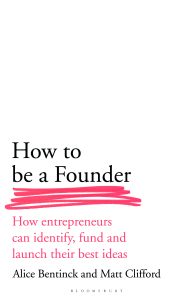By Matt Clifford, co-founder of Entrepreneur First and co-author of How to be a Founder: How Entrepreneurs can Identify, Fund and Launch their Best Ideas
 I’ve worked with thousands of founders since co-founding Entrepreneur First ten years ago. Something that I often see in aspiring founders is they assume a start-up will live or die by whether the idea is “good” or not. In reality, the strength of your idea will only get you so far. It’s a founder’s ability to persevere, no matter what obstacles are thrown their way, that will see them through.
I’ve worked with thousands of founders since co-founding Entrepreneur First ten years ago. Something that I often see in aspiring founders is they assume a start-up will live or die by whether the idea is “good” or not. In reality, the strength of your idea will only get you so far. It’s a founder’s ability to persevere, no matter what obstacles are thrown their way, that will see them through.
As a founder, you’re always experiencing moments of success and moments of failure. The best founders, though, see these so-called failures as obstacles, rather than as an end state. They have an extraordinary ability to just keep going. Your willpower is likely to be your single most valuable resource. This, along with the right co-founder, and a strong founder-idea fit, will be what carries you through to success.
I’d encourage any aspiring founder to consider these things in order to avoid common failure traps:
Cultivate willpower [Or, Running out of willpower]
In the earliest stages, most start-ups fail because the founders give up too early, instead of looking for alternative routes. Don’t write yourself off too soon. A founder with an abundance of willpower and tenacity will always find a way to build something that people want. For the tenacious founder, it’s simply a matter of testing, learning and pivoting.
Reframe what counts as failure. You can only truly fail if you give up, but changing your product, starting again from scratch, losing customers, being told your idea is rubbish, getting turned down by investors, running out of money, these are just hurdles – so long as you have the willpower to keep going. Your willpower is your most precious resource. If you run out of time or money, it’s your willpower that will see you through. Running out of willpower is the only sure-fire way to fail. The good news is, you don’t have a finite amount of willpower. It’s something you can cultivate.
It can be powerful to have your ambitions raised by the people around you. Simply being in that environment is a boost to your willpower. If you’re the smartest person in the room, you’re in the wrong room. Many founders look to their peers to boost their willpower. They’re driven by competition, so seeing someone smarter, more skilled, more creative only increases their stamina. The most productive founders constantly raise the bar for each other.
Find the right co-founder for you [Or, Choosing the wrong co-founder]
One of the biggest risks to your start-up is choosing the wrong co-founder. In the early stages of a start-up, founders tend to focus almost exclusively on their idea. Your co-founder, however, is far more important. Aspiring founders often go for a ‘co-founder of convenience’ – a school friend, an engineer they’ve been introduced to, a colleague who’s equally disgruntled about their day job. There’s very little thought that goes into a pairing like this. I was very fortunate to have met my co-founder Alice at work, and whilst we were lucky that it worked out, in retrospect that feels like a process that leaves too much to chance.
Choosing a co-founder is one the most important decisions you can make as a founder. It’s either the best way to put your company on a good trajectory from day zero, or, it’s the best way to create a doomed star-tup. Given the jeopardy, you should make sure that you’re being considered, strategic and tactical when choosing a co-founder. You need to test out co-founder relationships in order to find the best match. We actually celebrate co-founder breakups, because it means you’ve put the work in to discover that it’s not the right match, and you’ve been smart enough to cut your losses.
You should test co-founder relationships in the same way that you should test your start-up idea before going in at full speed. Start working together, and have honest and frank conversations about what’s working and what’s not. Use your productivity as a measure of how well you work together.
The reality is that it’s common for co-founders to discover that their working styles don’t match (you’d be surprised at how many co-founders break up because one is a morning person and the other isn’t), or that one feels as if they’re doing the bulk of the work, or that maybe you’re just not as passionate about the product as you first thought. These kinds of conversations tend to become the elephant in the room when you’re co-founding with an old friend, but it’s far more productive to discuss these things openly.
Celebrating co-founder breakups as part of the process removes any awkwardness, and allows you to make progress.
Use your Edge [Or, Building in the wrong area]
Founding is hard. There’s no getting around that. In order to succeed, you need to build in an area where you personally have an unfair advantage. You need to look at your unique set of skills and knowledge to decide which problems you’re best placed to solve. We call this your Edge.
You want to make sure that you have a right to win in the area you’re building in. Ten years from now, will people be able to look at your thriving start-up and explain why you and your co-founder were the right people to do it? Your success should make sense given your combined skills and expertise.
If your co-founder has a PhD in Robotics, and you’ve been able to identify some non-intuitive problems from your time working in the NHS, don’t then go away and decide to build a dating app. Work on a problem that the two of you are uniquely placed to solve, in an area that you understand far better than anyone else. Take into account both of your Edges combined, and consider any unusual intersections that might allow you to build a category-defining company, rather than building something that already exists, and then competing for market share.
I’ve seen hundreds of start-ups form, with a combined portfolio value of over $10bn. I feel pretty confident that the most important factor in determining their success or failure is the willpower of their founders – the ability to push through and find alternative routes in the face of obstacles. The two most important things you can do to increase your willpower as a founder are to find the right co-founder for you, and ensure you have founder-idea fit.
If you’re considering founding a company, start and don’t stop.
 Matt Clifford the co-founder of Entrepreneur First and co-author of How to be a Founder: How Entrepreneurs can Identify, Fund and Launch their Best Ideas, published by Bloomsbury Business on August 18, 2022, priced £25.
Matt Clifford the co-founder of Entrepreneur First and co-author of How to be a Founder: How Entrepreneurs can Identify, Fund and Launch their Best Ideas, published by Bloomsbury Business on August 18, 2022, priced £25.

